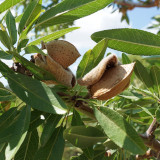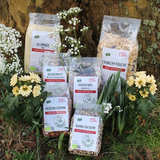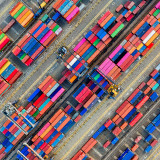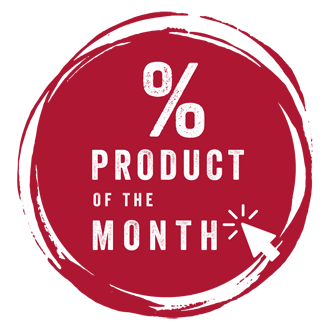Sustainability
We are convinced that organic farming is the healthiest way of farming for people, animals and the environment and therefore for the future of human life on earth. The aspect of sustainability is constantly taken into account in all our business areas: Conserving resources through sustainable packaging, environmentally friendly transportation, the use of renewable energies and issues of social responsibility are our constant endeavours as part of our responsibility to future generations. Overall, we operate responsibly in order to maintain the basis for our actions and to remain competitive.

Organic farming
As an importer, trader and producer of organically grown products, we know that organic farming makes a significant contribution to the sustainability of the ecological system. Resources are conserved and natural productivity is maintained. The method of organic cultivation does not produce any environmentally harmful substances, insects, plants and groundwater are spared. By dispensing with the use of nitrogenous mineral fertilizers, the production of which requires fossil fuels, significantly less CO2 is released. Instead, the development of humus soils is supported, which strengthen the binding of CO2 in the soil. Biodiversity is promoted because more animal and plant species feel at home on organic fields. In addition, organic farmers often contribute to the diversity of varieties by cultivating old varieties.

Resource protection
We separate recyclable materials and consistently recycle them. All organic waste is collected for processing in a biogas plant. We separate paper and foils from delivery, production, mixing and roasting and press them into raw material blocks.
Wherever possible, we save paper. Employees are encouraged to reduce consumption to the absolute minimum. In logistics we already work completely paperless, everything works digitally. In administration, we only file digitally, as far as this is compatible with the law. All unavoidable printouts are done on recycled paper.
Pallets are wrapped by machines, which saves 70% film compared to manual wrapping.
We use compostable filling material made of paper foam to protect our goods. In addition, cardboard boxes and filling material from goods delivered to us are reused.

Packaging
We are intensively pursuing the reduction of plastic: for 20 years we have been using plub-in cartons for the storage of our consumer bags, which means that we do not use adhesive tape as a seal. Since the beginning of 2022, we have been rejecting single-use plastic in our consumer packaging and starting with a plastic-free alternative. Our solution is a certified garden-compostable film, because in our opinion this is currently the most environmentally friendly, sustainable and grandchild-friendly answer to the plastic problem. We are gradually converting all articles in our range of consumer bags to this new foil. You can find more informationen here. Where we still have plastic packaging for our consumer bags, the amount of material is minimised, they are perfectly recyclable and suitable for optimally protecting our food from environmental influences and maintaining its high quality.
Wherever possible, we already offer plastic-free products. We look for and test alternative materials and work with suppliers of innovative technologies. Here, in addition to product protection, the very complex path of packaging from raw material to disposal must be considered.
Pallets are wrapped by machines, which saves 70% film compared to manual wrapping.
We use used paper and cardboard boxes to ship your products. We actively relieve the environment by avoiding the production of new packaging materials and at the same time protect your valuable goods in the best possible way.

Supply chain
We have built up our worldwide supplier network in partnership over decades. We support our partners in questions of social responsibility and sustainable organic farming. We collect our imports directly from the port of Hamburg, which is 20 minutes away. We only use air freight in absolutely exceptional cases if no other means of transport is suitable. All processing steps right up to small packaging are carried out at our company headquarters. We do not transport the goods to cheaper locations abroad. In this way we avoid unnecessary transport routes. Our own vehicle fleet was completely abolished except for one truck. Our partner forwarders can move the goods more efficiently. Our warehouses are well insulated and the roofs are mirrored, so that neither cooling nor heating is necessary. The cold storage halls are equipped with the latest energy-efficient cooling technology.

Ecology
We use renewable energies, a wood-fired heating system supplements the internal heat supply and we obtain 100 % of our electricity from renewable energies.
On our commercial site on the green edge of the city of Hamburg, we are home to a small nature reserve with old trees and a natural pond.
Wherever it is technically possible, we leave green areas or lay seepage paving in order to guarantee the natural processes for the formation of groundwater.

Employees
We are committed to the mental and physical well-being of our employees. Because family and career can be well combined in our company, we are allowed to carry the “Hamburger Familiensiegel”, a German certificate of the city of Hamburg. In addition, we promote a sense of community and healthy nutrition among our employees with a variety of offers - for example, fresh fruit and vegetables as well as muesli are always available for free consumption. For relaxation and good concentration we offer time and guidance for meditation.

Sustainability team
Sustainability is becoming more and more of a focus for us. Our dedicated sustainability team, consisting of members from all departments, analyses our current sustainability status. It identifies risks and develops solutions to derive goals and measures for sustainable management. The expertise and experience of our team members enable innovative approaches. Our stakeholders, including customers, employees, suppliers and the community, are of central importance. We aim to understand their needs and align our sustainability goals accordingly. Our team carefully examines the product range to find areas where we can make environmental and social improvements. We identify these areas along the entire value chain of our products. We then derive measures to reduce or eliminate these weak points. To implement the measures in a targeted manner, we use a materiality matrix as a structured tool. Together, we are on the path to a sustainable future - for us, our customers and future generations.

Code of Conduct
We place great emphasis on organic farming and sustainability in all areas of our business to ensure a future worth living. Our Code of Conduct is based on international standards and guidelines
such as the UN Declaration of Human Rights, the UN Sustainable Development Goals, the UN Global Compact, the OECD Guidelines for Multinational Enterprises, the ILO Core Labour Standards and the BSCI Code of Conduct.
Our Code of Conduct addresses all business partners along the supply chain. It requires compliance with human rights and local laws, the protection of freedom of association and collective bargaining,
the avoidance of discrimination, appropriate remuneration and working hours, as well as occupational health and safety. In addition, child labour is strictly prohibited.
We require that our business partners comply with applicable laws and standards and are committed to acting ethically and responsibly.
We expect controls to ensure our requirements. In the event of violations, indications and measures must be taken to remedy them.
The Code of Conduct also places great emphasis on equal opportunities, equal treatment and the promotion of diversity and inclusion in terms of recruitment, remuneration, training and career development.
It emphasises the importance of a safe and healthy working environment and access to drinking water and sanitation.
Our Code of Conduct is a living document that is regularly reviewed and updated to meet the latest legal requirements. Through the implementation of these principles
we aim to contribute to a just and livable world.





